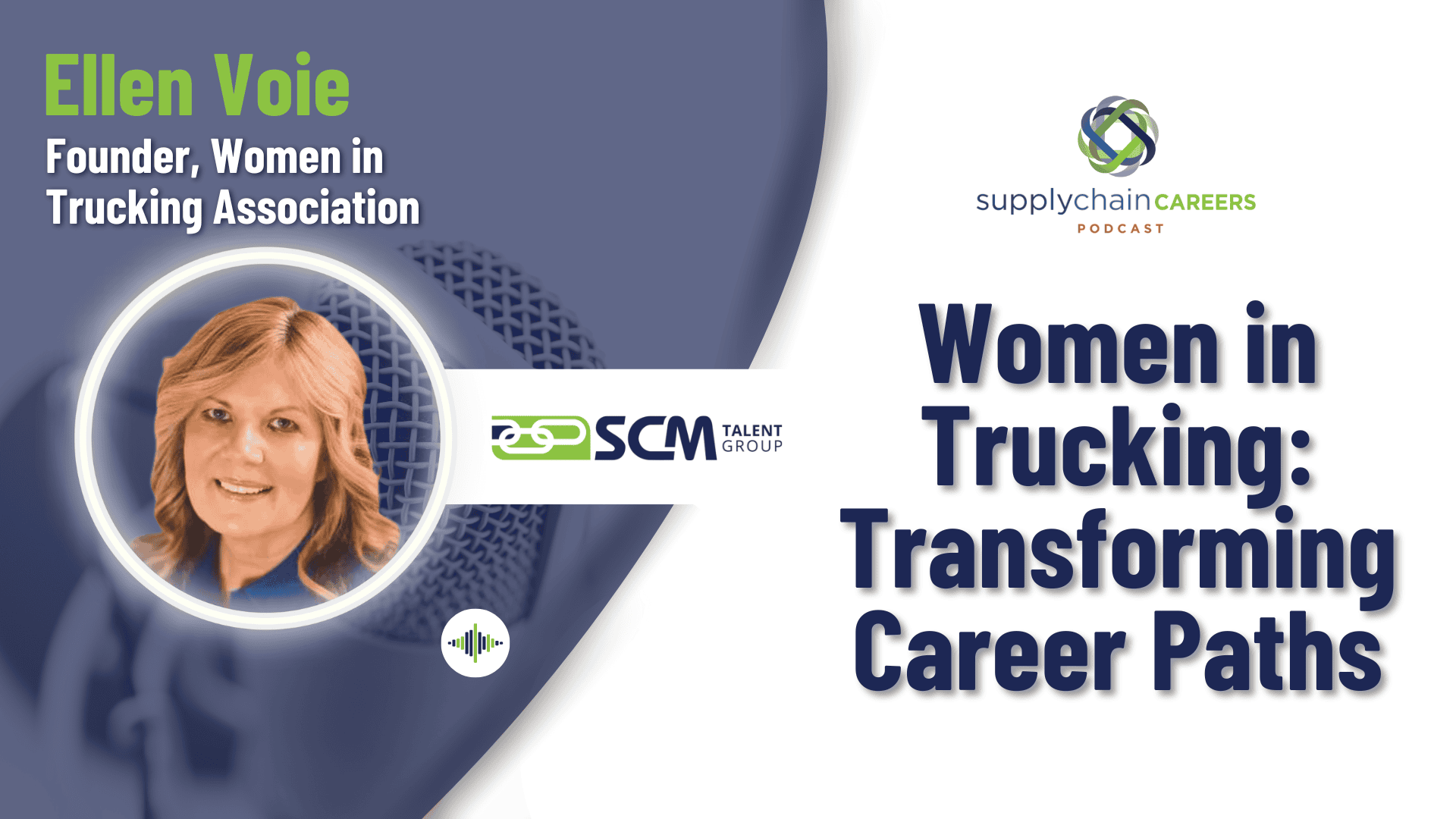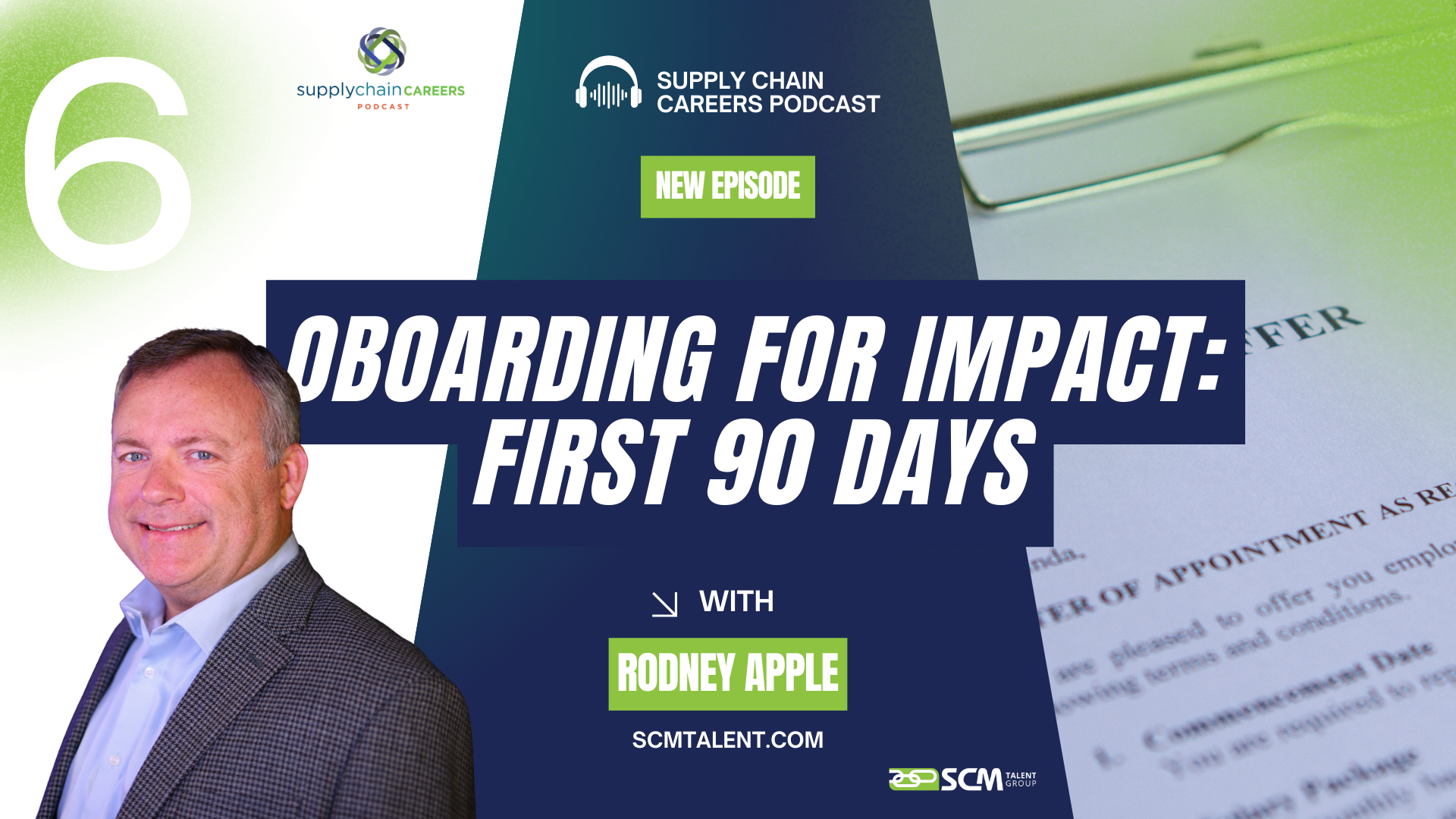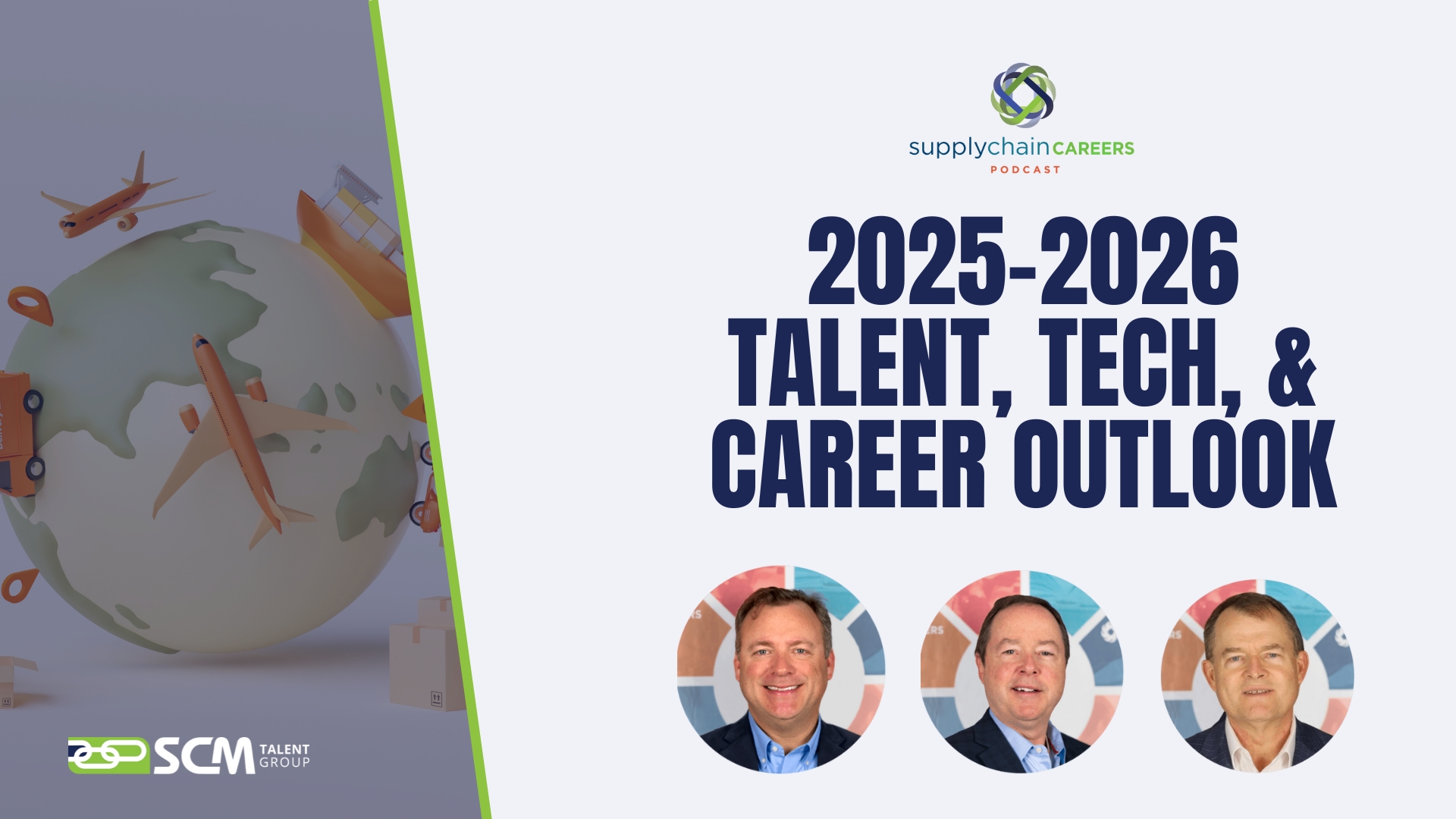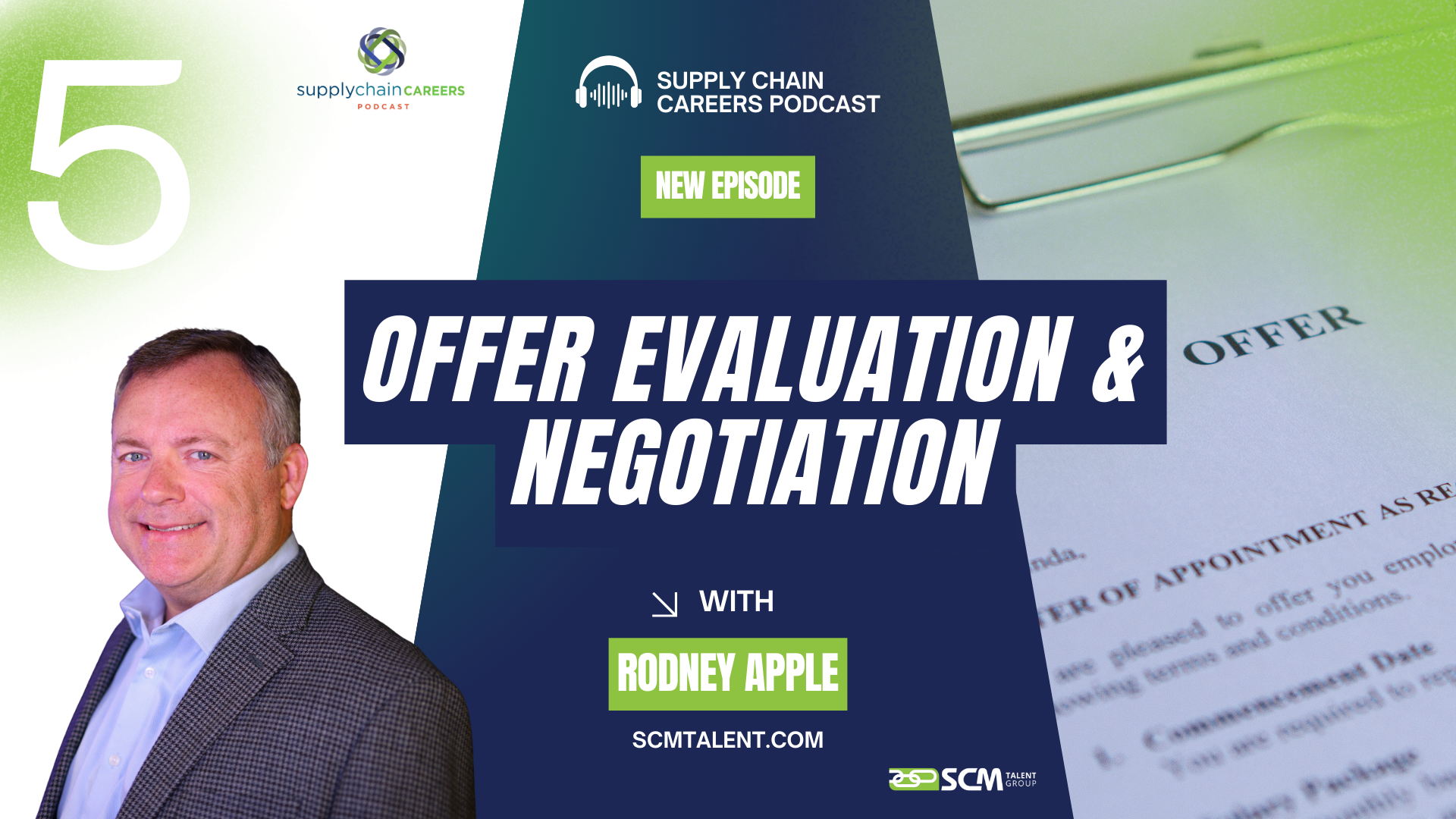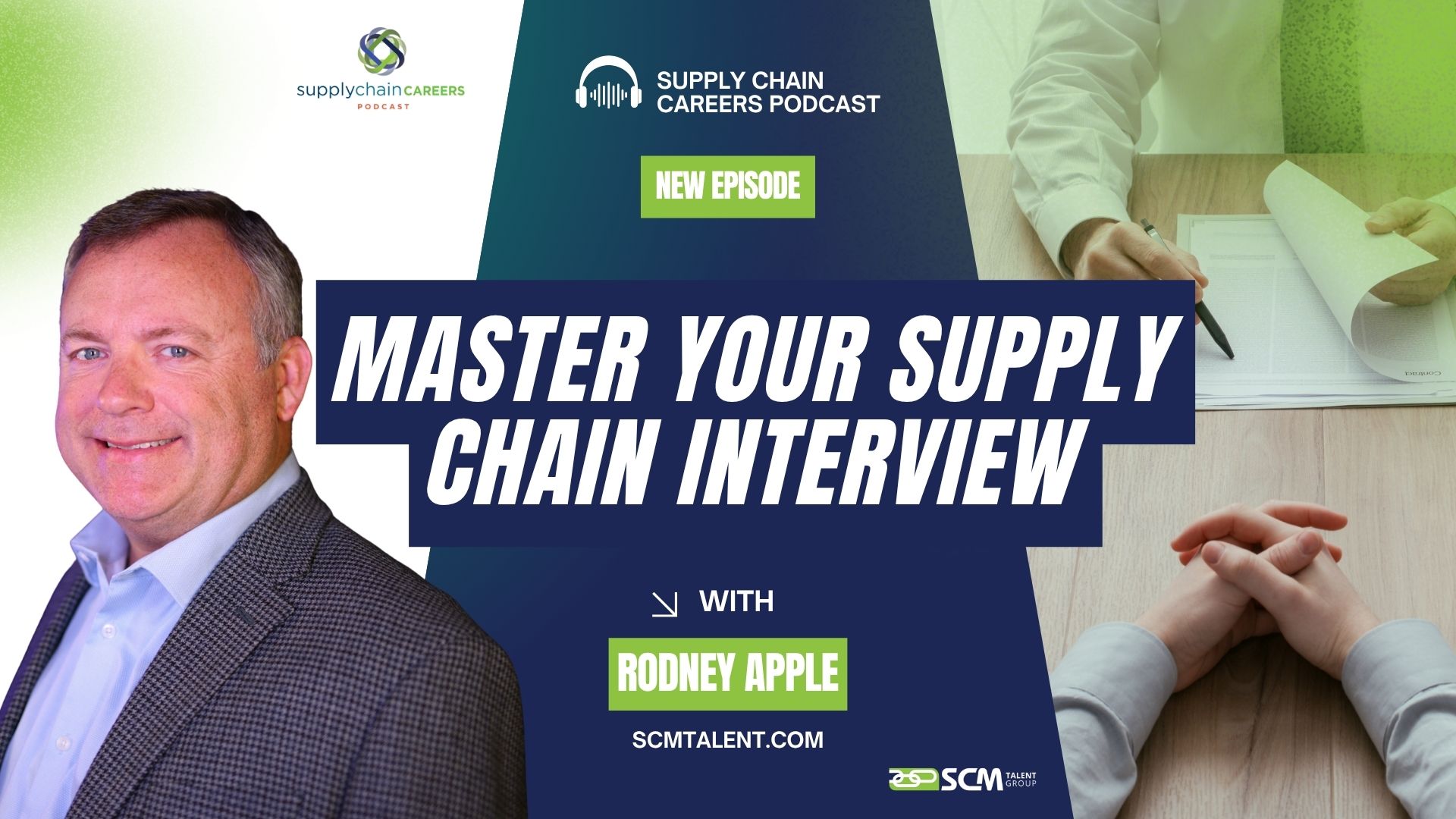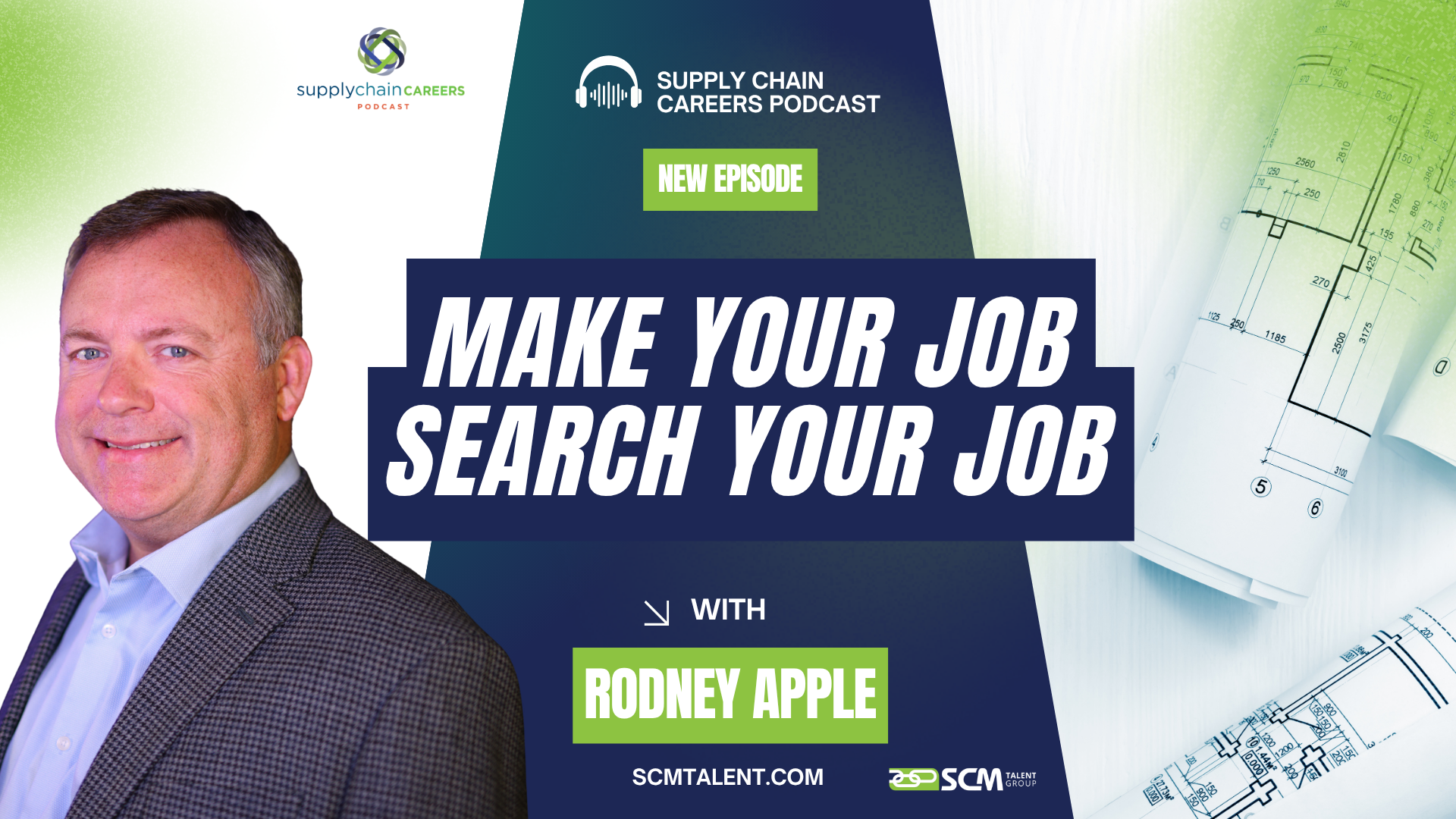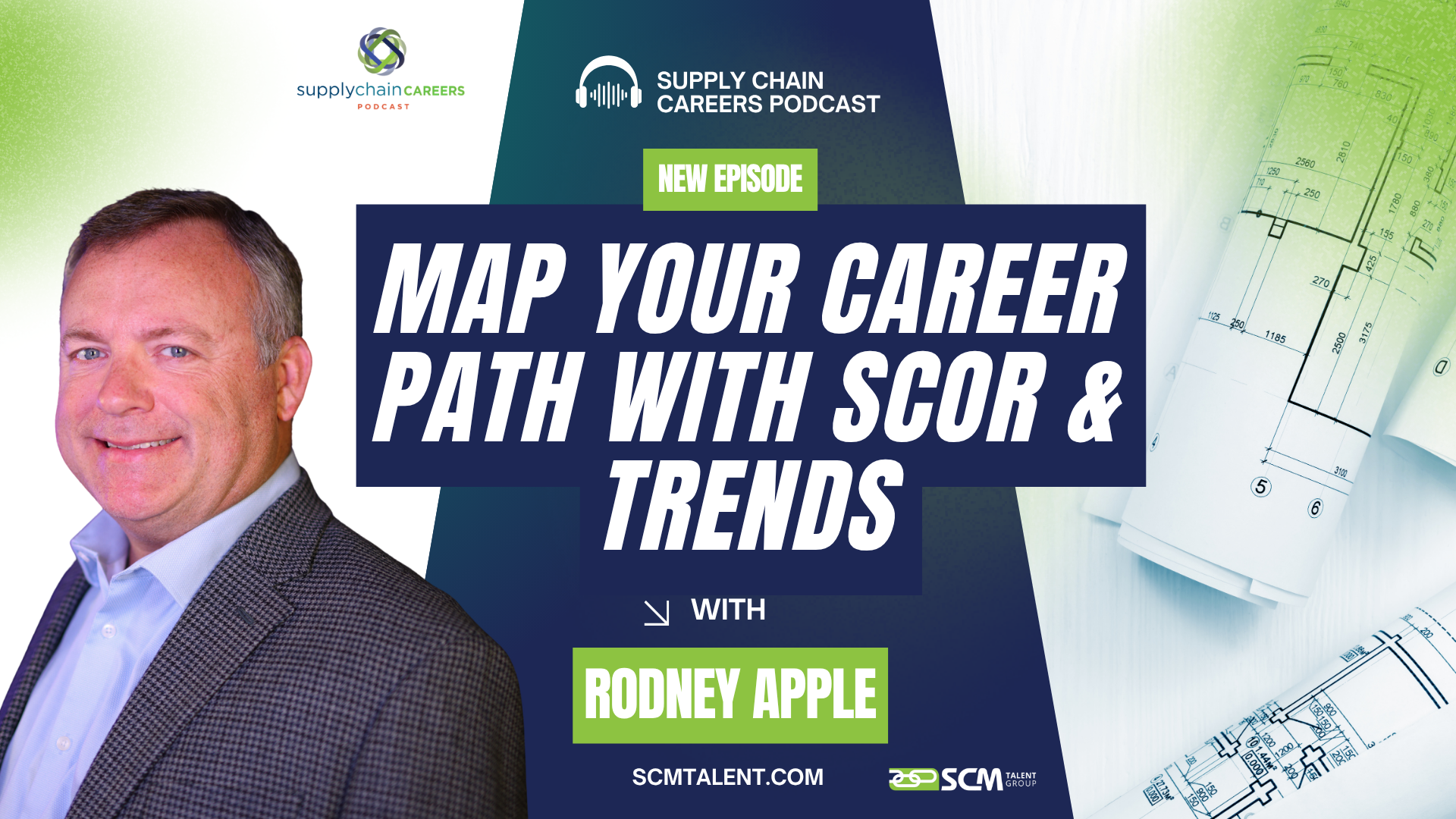[00:00:00] Mike Ogle: Welcome to the supply chain careers podcast. The only podcast for job seekers, professionals, and students who are focused on career enhancing conversations and insights across all aspects of the supply chain discipline. This podcast is made possible by SCM talent group, the industry leading supply chain executive search firm.
Visit SCM Talent Group at scmtalent. com. In this episode of the Supply Chain Careers Podcast, we’re joined by Ellen Bowie, founder of Women in Trucking. Ellen is yet another great example of people who did not start on a supply chain path. But when she went to traffic and transportation school while working for a steel fabricating plant, she clearly pulled onto the supply chain on ramp.
Listen to Ellen’s transitions, particularly as she got to the point of providing women with a greater voice in trucking. By founding the organization, building a strong board of directors with the biggest carriers and brands, and providing scholarships to grow the pipeline. She sees a lot more people becoming comfortable with blue collar careers rather than the must go to college path.
Push and supply chain has plenty of opportunities to offer, whether in trucking or in facilities, Ellen also points out the growth in last mile delivery, and she has seen tremendous change in trucking companies transitioning from a one size fits all model to actively accommodating individual needs. In closing, Ellen provides her best advice to others in supply chain and trucking.
I’m your podcast cohost, Mike Ogle, and I’m your podcast cohost, Chris Gaffney. Ellen, we’re happy to have you with us today on the supply chain careers podcast. Welcome.
[00:01:49] Ellen Voie: Thank you for having me on.
[00:01:51] Mike Ogle: Well, and what were some of the greatest influences that got you started in supply chain?
[00:01:56] Ellen Voie: I’m going to tell you that I was one of those who didn’t intend to be in supply chain when I was in high school.
I actually went to school for broadcast journalism. So imagine that I ended up returning home. My mom had gotten sick. And so I came back to Wisconsin and got a job at a steel fabricating plant doing drafting. I came to me one day and asked if I would move into the traffic department and they’d send me to school for traffic and transportation.
And that was before deregulation, believe it or not. It was about 1978, 79. And being a young female in the shipping department of a steel fabricating plant, when the freight rates were regulated by tariffs, meant that they had to get my business either by The service or through bribes. And I will tell you that in those days, bribes were, and so then I’d have to kick them out of my office.
But anyway, very few influences in those days, especially for women, because there weren’t women in supply chain, there weren’t women traffic managers or women at trucking companies. I had to turn to male colleagues who worked at other shipping departments. And one of them in particular was a wonderful gentleman who worked in a hospital.
equipment type environment. And he took me under his wing and really helped me understand the shipping and traffic and rules and things like that. There’s always somebody in your life who helps you through and answers questions.
[00:03:23] Chris Gaffney: So Ellen, when we have these conversations for our listeners who are navigating their own career.
Those forks in the road always weigh on people, and in many cases, in retrospect, they can be real important. So, we always want to ask about the two or three key transitions that you’ve made through your career, and anything that you can reflect on in terms of why you chose to make those moves, the kind of the thought process you used, and then lessons learned.
executing those transitions and then looking back on them.
[00:04:02] Ellen Voie: I haven’t had a lot of different jobs in my life, so I can touch on a couple of them. After I had earned my diploma in traffic and transportation management, and I got married, started a family, I did consulting for 18 years. And that was, you know, Using my skills, reading tariffs, auditing freight bills, driving qualification files, things like that.
So I’m glad I leveraged the education that I had received to earn a living. After my kids were raised and I had completed my bachelor’s and then my master’s in communication. I jumped into the nonprofit world and I took a job with a nonprofit called Trucker Buddy. It’s a pen pal organization. And that probably was the biggest pivot in my career.
Because it introduced me to a different type of environment, not a for profit, but a non profit, which means you’re really trying to change the world. And so I worked there for about six years and I was recruited by Schneider to come and work for them as manager of recruiting retention programs. And my job was to figure out how to attract and retain non traditional groups.
Now I’m back in a for profit environment. But it was a massive company with lots of drivers. And my job was very interesting because I got to focus on women. So I was focusing on how can we bring more women into the industries, especially in the driver population. And that’s when the light bulb came on in my head that there wasn’t a way for women to have a voice in this industry.
And while I was working there, I started Women in Trucking going back into the nonprofit environment, putting together a board of directors, writing a mission, doing all that. And so the nonprofit part of it, and then the women giving women a voice in the industry, I’ve now combined into Women in Trucking.
And so in March of 2007, Women in Trucking was born. So it’s, you’re talking about forks in the road, very different forks, but in a way they converge.
[00:05:59] Mike Ogle: Sounds like you had a couple of forks that had quite a bit of divergence to them. The tines weren’t necessarily parallel.
[00:06:06] Ellen Voie: True.
[00:06:07] Mike Ogle: And so, our audience should learn a lot more about women in trucking.
You mentioned a little bit about how it got started. How have you seen it evolve?
[00:06:16] Ellen Voie: So when I started Women in Trucking in March of 2007, the industry really was, I’m going to say agnostic about gender. I would hear over and over, oh, we just hire the best person. But then when I point out that the playing field wasn’t level, in other words, the uniforms were made for men.
The trucks had been designed for men. The truck stops had the showers were like a locker room environment. So women, if you wanted to take a shower, you’d have someone stand at the door and not. So it really wasn’t a level playing field. So listening to women and finding out what changes needed to be made in the industry, and then taking that information and going out and saying, if we want to bring more women in the industry, this is what we need to do before that.
I also had to prove to them why they should have more women. And there was very little data. In those days, a lot of companies didn’t even know what percentage of their CEOs or their drivers were female because they just didn’t keep that information. So starting to make people more aware of what women bring to the industry.
And one of the top things is women are more risk averse. So whether that applies to being in a C suite or the boardroom, the way women make decisions in a male environment may not be as. Welcome as the way men make decisions, which. Typically means men narrow the choices and make a quick decision where women will try to expand those choices, see if they’ve missed anything, trying to decide if that’s the best decision or not, maybe talking to other people.
But risk averse in the truck means someone who is a safer driver. So I didn’t have that kind of data at the time, but over the years, companies have come to me and said, We found that women are better with customers, better with paperwork or whatever. And so now I can take all that information, especially when it’s proven by research and stand up in front of people and say, this is why you need more women in your company.
These are the roles women can do, and this is how to attract and retain women.
[00:08:22] Mike Ogle: And so what is a little bit of the structure of women in trucking overall? You said you brought in a board. Where do they tend to come from? And who do you work with the most? On a day-to-Day, year to year,
[00:08:36] Ellen Voie: I set up women in trucking as a 5 0 1 C six, which is a membership based organization, which means that they pay dues.
It’s not supported by donations, which we do have a sister uh, organization, which is a 5 0 1 C3 charitable organization that provides scholarships, but it means that I would report to a board of directors, and the board sets the vision. And you tap into them. So on the board, Walmart, Daimler, Hyundai, Great Dane, Penske, UPS, FedEx, some pretty big names on the board of directors who support the mission and support the organization, both financially and with talent.
[00:09:21] Chris Gaffney: Ellen, I entered the field just after deregulation and I went to work at Frito Lay out of school in private fleet transportation, and probably a pretty rare situation because the peer group that I work with from a management standpoint, and I would, we had a traffic department, and I was a traffic supervisor and had drivers working for me.
Frito Lay may have been an early adopter and was very intentional, and many of my peers were women, and they may have been the first supervisor manager. But they were surely equal players in my mind, and I think Frito recruited well. They had the respective drivers in most cases, but maybe that was rare then.
And I guess as you see it now, and you could speak about it both from the leadership standpoint, as well as the front line. standpoint, what is your temperature today in terms of what progress has been made? What progress still needs to be made?
[00:10:23] Ellen Voie: First of all, Frito Lay was our very first global partner.
And Marc Rousseau from Frito Lay was our very first male on the board. When I put the board together originally, it was all women. So the biggest changes that I’ve seen are that companies are starting to be aware of how they’re treating their drivers. And when I say that, they’re getting drivers home a lot more.
They’re trying to accommodate a work life balance. They’re trying to include their families. They’re being more sensitive to driver’s needs, more so than in the past. When you started in the eighties, Hey, you hire a driver and you say, okay, here’s the truck, we’ll see you in three weeks or five weeks. And it’s not like that anymore.
So it’s a better environment for women as well, because if you’re trying to accommodate. Families, and either by providing daycare or by getting someone home. One of my best friends, he runs Intermodal. She gets up early, picks up rail, delivers them, and she can spend the evening with her children. So there are plenty of jobs out there that now accommodate women, but in the past, those jobs were harder to get.
Put it that way.
[00:11:34] Chris Gaffney: The follow up to that is you’re clearly influencing the industry at large and specifically, and you do that in a number of ways. But one of those that I think is noteworthy is your scholarship offering and the origin of that. And in your mind, what you hope to accomplish, how it’s evolved, and then what you’ve heard from those who have benefited from it.
[00:11:57] Ellen Voie: Over the years, in the past 20 years, the response I would get was we just hire the best person. And instead of let’s focus on a more gender diverse workforce. And the biggest change I’ve seen in the past few years is that all these companies are now putting DE& I initiatives in. So you’re seeing them focus on, wow, we want different voices, especially at the higher levels.
We need to hear different perspectives. One of my favorites is when I think it was Coca Cola said, we want our suppliers, And our shareholders to be as diverse as our customers. Lots of people drink a Diet Coke. So it’s a good reflection of how far we’ve come that they’re recognizing that different voices bring different perspectives, which make it better for everyone.
[00:12:50] Chris Gaffney: No, that’s great. In terms of what’s next, in terms of your priorities and where you’d like to see things go and how you’re trying to influence that, what are a couple things that are top on your list?
[00:13:04] Ellen Voie: I want to see the industry better address unconscious bias. I think a lot of times people make assumptions and I hear this over and over, they’ll say, Oh, we can’t get a woman to haul flatbed or oversized or overweight or home delivery.
They’ll just make that assumption. But yet. The women who are doing it love their jobs and they’re making good money. So a lot of times we make an assumption and even in the C suite, Oh, she just had a baby, so she’s not going to want to travel. We make assumptions about people. We need to remove those assumptions and be more open for adapting the workplace to fit what people’s needs are and whether that fits their needs.
A great example, waste management wants more female drivers. How hard is it if you’re going to work at two in the morning and picking up residential trash, how do you find a daycare at two in the morning? So waste management said, great, we’re going to set up a daycare. That accommodates these special hours, things like that.
You would have seen that 20 years ago, they would have said figured out, but now they’re making it their problem.
[00:14:11] Mike Ogle: I can only imagine that there were single fathers who were also in similar kind of situations and similar bind and just wouldn’t go into the.
[00:14:20] Ellen Voie: Yeah. It’s funny. Cause when you talk about careers in high school, I wanted to be in broadcast journalism and here, and I got my third, I earned my third class radio operator’s license back in the seventies.
And here about seven years ago. I had been on a number of different Road Dog Trucking shows. People would interview me on shows. In fact, one of them I was on once a month. And finally they said, you should have your own show. And great. So every Saturday at 10 central, 11 Eastern, it’s the women in trucking show.
And it’s different from what you’re going to hear on Road Dog Trucking, because we have each week, we have a topic. This past Saturday, May is mental health month. So I had mental health professionals on talking about mental health and drivers and stress and work life balance. And it could be an author’s on, we could be talking about parking or legislation or whatever, but every Saturday morning from 10 central to noon for two hours, I have guests on and we talk about, and it’s a call in show.
So you never know what the drivers are going to call in and ask or say.
[00:15:25] Chris Gaffney: I would be curious, because I follow some radio shows, I assume you have some frequent callers on your list.
[00:15:32] Ellen Voie: I do, and what’s funny, they use their CV handles, so I don’t necessarily know who they are, but then they’ll come up to me at a trade show or a conference and they’ll say, Oh, I listen to you all the time.
[00:15:45] Chris Gaffney: Oh, that’s fabulous. Obviously, when you’re talking to them, and then you’re talking to C suite folks, you’ve got your finger on the pulse of what’s motivating folks. So I’m curious, as we look forward for the next few years, maybe it’s both for the frontline, it’s for the supervisor, and it’s the senior What are the things that you think are really shifting people’s priorities and focus from a career standpoint?
What should our audience keep an eye on based on what you’re seeing and hearing?
[00:16:17] Ellen Voie: First of all, people are becoming more amenable to blue collar careers. It’s not send your child to college automatically because a lot of people don’t fit into that workplace. My son in law is a perfect example. He didn’t want to go to college and he ended up being a welder and then ended up selling insurance and he loves it.
He doesn’t have a college degree, but it’s fine. My son is an electrician. We’re much more open to people in blue collar job and. And a lot of jobs in trucking might require some certification, but not necessarily a four year degree. So I think that’s the biggest change is that it’s okay to be a safety director with a CDS or be a truck driver.
[00:17:03] Chris Gaffney: It’s interesting. I will absolutely comment on that. We’re doing some workforce growth work in Georgia and with the change in the economy in the United States, There are some really good jobs out there for folks who don’t prefer to go that college route, and you can make a very competitive living that will still allow you to get to a place where you can buy a home and go on vacation, have a new car, save for retirement, all that stuff.
So I think it’s important because as you said, that’s not a fit for some people. It’s also not what motivates them and may not also fit for where they want to live. So I think it’s true that across the supply chain. And I think that’s a lesson for the folks in those careers. I think it’s also important for the folks staffing for those jobs is you’ve got to find a way to make your job attractive to folks because they’ve got options, right?
To your point, you could drive over the road. You could drive local, right? Construction’s still big. So there are CDL jobs in that space that pay well. But in many cases, those same folks are attractive to folks who want those folks to come work in a manufacturing site or a DC as well.
[00:18:11] Ellen Voie: There’s another thing that I’d like to add, there’s a whole slew of new jobs that didn’t exist a number of years ago, and that’s Amazon, the home delivery type.
So if somebody doesn’t want to drive a tractor trailer, they have plenty of options on vehicles that you may not make the same amount of money, but you’re still driving and delivering packages to homes.
[00:18:35] Chris Gaffney: So if you think of the folks on your board who are forward thinkers, what do you hear them talking about in terms of how they’re trying to shape their work world to be attractive to the best folks out there, regardless of what the career, what the job is in their organization?
[00:18:57] Ellen Voie: So I get invited to a number of, they have like employee groups, a lot of organizations Whatever they call them, but they’re bringing on groups of diverse individuals. So it could be a young, a nursing moms group or an LGBTQIA group, or it could be a women’s group. But that was one of the first ones typically, but it could be some sub group and they’ll bring in those groups and they’ll listen to them and then they’ll make sure that the organization is very accepting.
People, these people that might not look or act like us. And so I think the result of that is that people are feeling that they can bring their real self to work these days. Does that make sense? It’s not hiding. You’re not covering tattoos or wearing your hair in a certain way or not being able to dress in an ethnic way.
You’re feeling comfortable because those discussions are taking place where in the past, I think a lot of people felt that they needed to fit in and now the company is trying to be more inclusive so that. It’s not that difficult to fit in. Does that make sense?
[00:20:13] Chris Gaffney: Yeah, it makes total sense. And in the field that we’re talking about, there’s always a need to bring new people in.
And I was fortunate again, early in my career to work around what I think still exists in a few places are truly professional truck drivers. And these, these are folks who were the best. They were a million miler. 2 million miler safe driver, great with customers, super, super diligent. And frankly, as a young professional gave me good feedback in some cases, coaching that I still take today.
So in my view, the companies who are smart about this are doing this for a very selfish motivation is that they want the best of the best regardless. And if they create that welcoming environment. They have access to the best talent pool and the biggest talent pool that’s out there.
[00:21:02] Mike Ogle: During this short break, we recognize that this podcast is made possible by SCM Talent Group, the industry leading supply chain executive search firm.
Visit SCM Talent Group at scmtalent. com.
[00:21:18] Ellen Voie: Oh, absolutely. I’ve seen the change and I love the way Employees are feeling valued for what they bring, even if it is something that’s different. Some of my best friends are in the LGBTQ community and one large company started employee resource group. for the LGBTQ community and they feel much more open to discussing their personal life at work where before you would have had to and one of them she said when they introduced her she kept using the term spouse instead of Using the term wife, and she said, now I feel like I can say my wife and why not?
Why shouldn’t we just let people be their true selves instead of hiding something?
[00:22:06] Chris Gaffney: Now it makes a difference. I’ll give you an anecdote. I drive near the intermodal yard on the West side of Atlanta. And I drive about the same time. And JB Hunt has a marshaling yard. Probably a mile and a half from the main intermodal yard.
I see the same lady riding a yard dog every morning. And I managed a fleet of yard dog drivers early in my career. We didn’t have any women on that team at that day, but she clearly knows what she’s doing because I see her wheeling a very challenging left turn a few mornings of weeks, having that additional resource in the workforce is obviously working.
For folks like J. B. Hunt.
[00:22:43] Ellen Voie: Oh, absolutely.
[00:22:45] Mike Ogle: And Ellen, how have you seen trucking life change in recent times? What can we do to be able to keep people wanting to be in this business?
[00:22:53] Ellen Voie: I’ve seen companies asking more questions, like how can we accommodate you? Where before the company felt the carriers, especially I’m talking trucking companies, but in the past, it seemed like they thought they had all the answers and now.
It’s changing. And so they’re actually coming to their employees and, and for us at women in trucking, it’s typically female employees and they’ll sit down with their female employees and they’ll ask them, what can we do to accommodate you? And I have sat in on many of those conversations and it’s surprising that some of the things that they’re asking for are very little, but the company didn’t think of it.
And one of them, this is years ago, but I was at one company event where the women said, can we get women’s cut uniform shirts? And the manager goes, Oh my gosh, we don’t have. Women’s shirts for you? And they said, no. And these shirts don’t aren’t fitting. And another company where they had local deliveries, these women were talking about this one warehouse where they delivered all the time.
Wouldn’t let them use the restroom. And they’re like, why aren’t they letting you use the restroom? Either we need to have a conversation with them or we have to accommodate you somehow, get you somewhere. But things like that. They’re actually going to their employees and saying, what can we do to better accommodate you?
So that’s been a big change because in the past it was like, we know what’s best for you.
[00:24:14] Mike Ogle: And a little curious how some of this, where did that begin? Did it start with some of the smaller firms? Did some of the, the big ones be a huge influence that made the others follow? Which way did this end up happening?
[00:24:31] Ellen Voie: It was really the bigger ones. And like Walmart, I’ve been to Walmart events. I get invited to a lot of events and Bennett has, the women would drive and Walmart would bring in their female drivers and have them tell the truck manufacturers, what can we do differently or how can we better accommodate you?
And so lots of trucking companies are bringing. Their drivers in or having listening sessions and the CEO or some high level executive is listening to them so that they can get their feedback. And that makes it better for everyone. In my opinion.
[00:25:02] Chris Gaffney: No, that’s fantastic. One of the things we also like to ask folks on this podcast is really about advice you have received.
And so I am curious if there are two or three pieces of advice that you have heard in your career that have proven to be really durable and maybe those that you share and offer. To folks that you mentor and coach.
[00:25:28] Ellen Voie: So the first piece of advice is have a thick skin, especially when you’re a minority in an industry that’s predominantly male, have a thick skin.
Don’t take everything personally. But secondly, you have to walk the walk. You have to establish your credibility. I had to establish the credibility of women in trucking so that companies would know that we were going to do what we said we were going to do, which is be a resource to bring more women into the industry, so you really have You have to walk the walk.
But one of my favorite pieces of advice is assume good intent. And when I think about that, and it really changed my perspective because someone did something that I thought was against me. It wasn’t. It was something they were doing for themselves, but I felt excluded not thinking that they weren’t thinking about me
And so a lot of times we inject ourself into a situation that maybe we shouldn’t have done that. And it’s really not about us. So assume good intent and, and I think about that, like even driving. If someone cuts you off, or maybe they just found out they have cancer, or maybe they just got bad news, or maybe they’re distracted for some other reason, we shouldn’t think it’s about us.
It could be something that they’re dealing with. So assume good intent is my favorite piece of advice.
[00:26:49] Chris Gaffney: I like that. Now, I have a daughter who is in the logistics field, okay? So she’s in physical movement, and I’m, I am proud to have someone who started in the space that I started in. When you talk to people, or if you heard from a younger woman who had an interest in getting into the broader field of supply chain, if you had to say, why transportation?
Why trucking? Why logistics? Thanks. How would you sell them no matter where they’re trying to come in the industry?
[00:27:21] Ellen Voie: When people come into this industry, a lot of us never leave. And the reason is it’s the people. So I tell people don’t focus on the trucks. Don’t focus on the warehouses. Don’t focus on the freight.
Focus on the people, because that’s really what supply chain is all about. It’s really the people and that’s what keeps us. So I would say, think about how everything we touched, everything in my office right now came on a truck and what a valuable service that is. This industry provides to people, but we have to make it personal.
And once you start making it personal, like that truck driver up there could be someone’s mom, grandma, and make it personal. It’s really about the people. So I would say focus on the people.
[00:28:06] Mike Ogle: I think that’s fantastic. So you’d mentioned that you go to a lot of events. And in a lot of those interactions in the past couple of years, are there some themes that you’ve heard people get into that things that they have concerns about or direction opportunities that are available?
Are there some things that you’re hearing at those events that, that you can share?
[00:28:30] Ellen Voie: Yeah. A lot of the panels that I get asked to be on are about DE& I. Diversity, equity and inclusion. And so they’ll put a diverse panel together and talk about how you can, maybe it could be bringing in immigrants, maybe it’s bringing in convicted felons or bringing in formerly incarcerated people, but it’s.
How being on panels that are looking at different ways to attract talent in this industry that we might not have thought of in the past. So I’m seeing a lot more of that.
[00:29:01] Mike Ogle: Yeah, that brings up another interesting piece that the whole idea of being able to get people to meet people. So you talk about it being about people in this industry and.
Those kinds of events, no matter what they are and what piece of supply chain seem to have such a great value. Have you seen anything changing in these events that help people get to be with each other instead of being in their own individual groups?
[00:29:31] Ellen Voie: We always do a survey after the Women in Trucking Conference, the Accelerate Conference, which is every November, typically in Dallas.
We always do an after survey. And the number one reason people go to events is networking. We They want to find someone who’s doing their job at another company so they can do benchmarking. If there’s a female engineer at Daimler who meets a female engineer at PACCAR and they’re like, Oh, we’re not giving them away company secrets, obviously, but someone in that role at another company so that you can lean on them and say, Hey, how do you handle this?
And today you can do a lot more virtually as well. We have at Women in Transcription, what we call the Engage platform. It’s a social platform. It’s behind the walls. You have to be a member, but you could go on and ask a question or say, is there anyone here that started a logistics company and how did you do this?
[00:30:26] Chris Gaffney: Ellen, I’ve got one last one and people outside of this industry, in some respects. There’s a common view of being concerned about safety when it comes to large vehicles. My experience having been in the industry is it’s a priority. How do you articulate from your friends inside to outside of the industry?
And give them confidence that the folks making these decisions and physically moving these assets are really focused on safety when they’re out there doing their jobs.
[00:30:55] Ellen Voie: I’ll tell you, I’ve done that a lot. And one of the things that I’ve always focused on is giving ride alongs to legislators and regulators.
And one of our most memorable ride alongs was to a safety advocacy executive with Crash Citizens for Reliable and Safe Highways. And I met him, I served on the United DOT entry level driver training advisory group, and they always have advocacy groups on there. And he would introduce himself as Someone who was active against the industry because his mother and sister and three nephews have been killed by a fatigued driver.
And so I said, you’re up on Capitol Hill testifying against the industry. Have you ever been in a truck? And why would I want to ride in a truck? And he said, because you really need to know. What you’re talking about. So I set up a ride and believe it or not, it was shortly after a very famous, a comedian that was injured by a Walmart truck.
And so I asked, I said, can you, can we set this up and give this safety advocate a ride in a truck? And of course we had to get the attorneys involved and everything, but he met us. The agreement was we wouldn’t tell anyone, we wouldn’t have any media there, but if he was okay with it, we would like to do something after.
So he did the whole thing on YouTube and he was so surprised at how safe the driver was. And he kept asking her about all the equipment in the truck. And the question that was most, I think, influential in his conversation with her, he said. What if you’re tired? And she said, then I pull over. He said, but what if your dispatcher tells you to keep going?
And the driver said, then my dispatcher gets fired. So he was, he said, I really didn’t understand the industry and how the industry really is focused on safety. And he did a YouTube video about his ride and it will bring you to tears because he did lose his mom. sister and three nephews to a fatigued driver, but we changed his opinion.
And to me, we gave the head of the national transportation safety board a ride with five different drivers on it from Washington, DC to Louisville, Kentucky, where she spoke at our conference, Debra Hersman. And what do they do? They inspect, investigate accidents, right? So they’re always on the negative side of it.
And she rode with these drivers and she was really amazed at how safety focused the industry is. So we have to bring people from outside. In show them what our world is and say, we really are focused on safety.
[00:33:27] Mike Ogle: That is such a fantastic point to be able to put into this. I
[00:33:30] Ellen Voie: would like to add one other thought about safety.
When I speak to groups about bringing in female drivers, I tell them there’s three aspects to safety. The first one is, uh, where are you sending the driver? Is it a dimly lit area? Is it a bad part of town? Where are you sending them? Secondly. Are they the captain of their own ship? If, if they say, I feel uncomfortable driving because there’s a snowstorm, do they have the right to turn down a load because they’re concerned about their safety?
And the third one is how well maintained is the equipment? Because broken down equipment is not safe. So those three things are what women are looking for. And I will tell you that female drivers are much more apt to check out his company’s safety records before they go to their company, because Safety is a huge concern.
[00:34:21] Mike Ogle: And you did bring up one other question there. And in my mind was just trying to understand when somebody might be thinking about going into a career, particularly underrepresented area, or certainly with women. Is there any kind of, like when you mentioned ride along programs of being able to get somebody interested in the industry and give them that opportunity to experience what it’s really, so they don’t have.
The, the fear or the thoughts that they might’ve had preconceived notions in their minds.
[00:34:51] Ellen Voie: There’s a couple of things that we’ve done at Women in Trucking. We have a driver portal on the website. That’s just for drivers to ask questions. And when we get questions, we’ll get someone to respond either in a video or a paper, and it could be, how do I choose a truck driving school?
How do I choose a carrier? What questions should I ask when I go to a company? And lately it’s, can I have a felony and work for a company? And the answer is, depends on what they’re hauling. So it’s asking a lot of questions, getting all that information, being that resource. We also have image team drivers who do the ride alongs and they’ve been In the media, we’ve had drivers in the wall street journal USA today.
We’ve done ride alongs with all kinds of different media companies and asking the right questions and getting that message out
[00:35:36] Mike Ogle: and thinking of that from your side as well, where are some of the best places for people to get information, particularly women about their interest in careers in trucking?
[00:35:47] Ellen Voie: Women in trucking. org. It’s all there. Even our scholarship foundation, you can link to it and apply for scholarships as well.
[00:35:56] Mike Ogle: Excellent. Ellen, thank you for a great conversation and all your insights about supply chain careers and particularly women in trucking.
[00:36:04] Ellen Voie: Thank you for having me on. I appreciate it.
[00:36:11] Mike Ogle: Thanks for listening to this episode of the Supply Chain Careers podcast. Be sure to listen to other episodes and sign up to be notified when future episodes are released. As we continue to interview industry leading supply chain experts. This podcast is made possible by SCM Talent Group, the industry leading supply chain executive search firm.
Visit scmtalentgroup at scmtalent. com.
